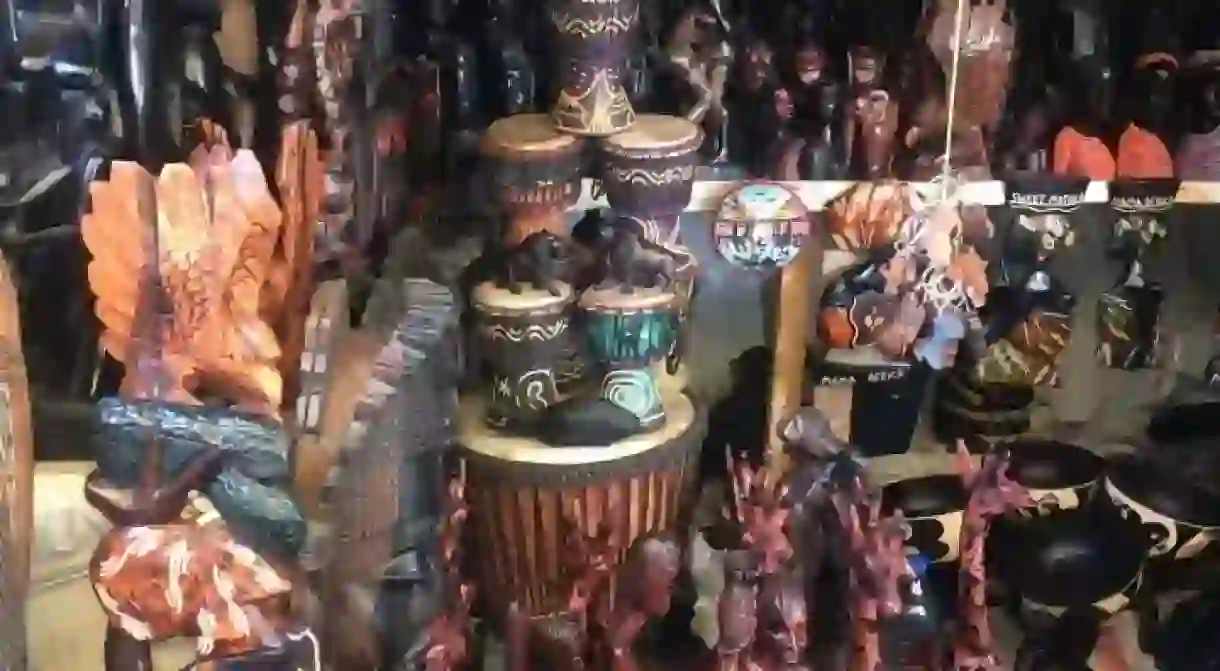An Essential Guide to Lagos' Lekki Market

The location of the Lekki Arts and Crafts Market (Jakande Art Market) is as uncommon as the arts, crafts and other goods and services it has on offer. It’s tucked away in one corner of the Lekki-Epe expressway and unless you’re looking for it, you won’t find it. Here’s our guide to making the most of Lagos’ bustling Lekki Market.
One of the things that will stand out is how well organized the market is, especially compared to the topsy-turvy nature Nigerian markets end up having, no matter how well organized they might be. But, like any other market, the best time to shop is early in the morning, in order to avoid the Lekki traffic and the throngs of people who crowd it in the early afternoons and evenings.

Just like an open-air gallery, the shops have different crafts and arts on sale, and each piece comes from a different part of Nigeria. From wooden sculptures, masks, necklaces and bracelets to intricately designed chairs, bowls and metalworks, you’re bound to find something that catches your eye.
Aside from arts and crafts, the market also sells fashion accessories and Ankara fabrics, which are used in so many things these days. From Ankara bags to clutch purses, shoes covered in fabric and even neck pieces and other accessories, all made from Ankara. There are tailors who provide on-the-spot services for clients who wish to make clothes and other items, such as pillow cases and curtains.
Wear your bargaining hat
As with all Nigerian markets, you’re expected to bargain for the goods you’re buying. This not only establishes a good feeling between you and the trader, you also come away with a sense of satisfaction. In most cases, an outrageous amount is proposed as the opening price, but this depends largely on the kind of clothes you’re wearing and the way you carry yourself. If you enter the Lekki Market like a newbie (‘journey-jus’-come’ in Nigerian parlance) the traders will attempt to fleece you. Go in armed with your most charming manner and try not to stand out. Usually when bargaining, halve whatever price the trader first offers. This will usually be accompanied by scandalized grunts, but in the end both parties should be able to arrive at a fair price.
Don’t be afraid to window-shop in as many places as possible. At the end of the day, this gives you the advantage of getting different art pieces at affordable prices. Usually old pieces are kept behind the new ones, so you need to be patient and know what you’re looking for, even if you only have a rough idea. You should also go in with an open mind.

Don’t get trapped into buying touristy stuff
There are certain kinds of crafts that are practically mass-produced to attract tourists. The defunct Molue buses and men in canoes are typical of these arts. It’s not that they are poorly crafted, just that the designs are overused and there are more exciting, new arts and crafts being produced all over Nigeria presently. And you can be sure to find some important pieces hidden away in one of the quaint little shops that populate the Lekki Arts Market.

Splurge on Ankara
You can never have too much Ankara: the fabrics are not only gorgeous, they also come in a variety of qualities and can be used for more than just making clothes. When buying the fabrics, check out the name of the manufacturer – this will not only help you decide how to bargain, it will also give you an idea of what the cloth can be used for. By all means go ahead and order pillow cases, bed sheets, and even a summer gown from the tailors at the market, just don’t give them anything too complicated, or you’ll end up with ruined fabric.
Tip: Don’t go to the market during the rainy season; it is usually flooded and hard to walk around. If you must go, at least ensure it hasn’t rained heavily previously in the week.













